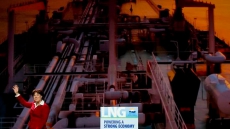CALGARY — The CEO of long-struggling Talisman Energy Inc. (TSX:TLM) says a multibillion-dollar takeover by Spanish energy giant Repsol is the best possible outcome for shareholders and he expects the deal will receive federal approval.
The total purchase price is US$13 billion— US$8.3 billion for Talisman stock plus the assumption of its debt.
Talisman's Hal Kvisle said the Repsol deal is a "compelling opportunity" for a company that has faced a litany of challenges, from free-falling crude prices to its substantial debt load.
The takeover has the unanimous support of both companies' boards of directors, said Kvisle, the oilpatch veteran who came out of retirement more than two years ago to help turn the Calgary-based company around.
"Talisman's board firmly believes the transaction with Repsol maximizes value for Talisman shareholders relative to any alternative available to the company," he said.
"The board considered in detail other alternative options and this transaction was viewed as superior to all other options available to the company."
The Canada Pension Plan Investment Board was said to be looking at a deal with Talisman, according to a Bloomberg report.
The US$8-per-share deal marks a 75 per cent premium to Talisman's seven-day volume-weighted average share price.
Also under the deal, Talisman will pay cash dividends of 18 cents per common share prior to closing. The Talisman board is recommending shareholders accept the deal at a special meeting to be held in mid-February 2015.
Completion of the transaction, which is targeted to close in the second quarter of 2015, is subject to customary closing conditions, including court approval.
Kvisle said Repsol will also apply for approval under the Investment Canada Act — the same legislation under which oilpatch takeovers by Malaysian and Chinese state interests were reviewed in 2012.
Unlike the deals involving Malaysia's Petronas and China's CNOOC Ltd., Repsol is a private company that is not owned by the Spanish state.
In 2012, Ottawa approved the foreign takeovers of Nexen (TSX:NXY) by CNOOC, and Progress Energy Resources Corp. (TSX:PRQ) by Malaysia's Petronas but tightened rules around deals involving the purchase of large Canadian companies.
"We are confident that this transaction will be universally approved and that it will provide meaningful and exciting opportunities for Talisman's global employee base," said Kvisle, noting that Repsol aims to establish a corporate presence in Calgary.
In a research note, CIBC World Markets analyst Arthur Grayfer said he doesn't see why Ottawa would block the deal, noting Talisman has no presence in the oilsands — one of the concerns raised with CNOOC's takeover of Nexen.
Plus, Grayfer notes, Talisman's Canadian production is only 15 per cent of its total corporate output, with the rest mainly coming from the United States, Southeast Asia, Colombia and the North Sea.
He said the premium paid is higher than expected and called Repsol's offer a "knockout bid."
"We do not expect another party to come in and top the offer, given the premium paid, and that the company will have challenges in the current macro environment."
Repsol has been on the hunt for investment opportunities since its expropriation from Argentina in 2012. The Talisman acquisition will roughly double Repsol's upstream presence, said Kvisle.
"The combined company will be bigger, stronger and have a greater capacity to compete."
Kvisle said he expects the integration to be "quick and seamless" as the two firms have complementary cultures and values.
While he made no specific mention of potential workforce cuts — often an outcome of such deals, as roles overlap — Kvisle did say Talisman's experienced employees were a draw to the Spanish firm.
"In short, they like our assets and they like our people," he said.
Repsol chairman Antonio Brufau confirmed that sentiment in a release.
"Talisman has strong operational capability, a highly skilled workforce and we look forward to leveraging their expertise as we partner to create a stronger, more profitable and competitive organization," he said.
The combined company will be among the 15 largest privately-owned oil and gas companies with activity in more than 50 countries and more than 27,000 employees.
Analysts have predicted the pace of mergers and acquisition in the oil patch will pick up as low oil prices put pressure on some names, especially those with weak balance sheets.
Crude prices are down by about half over the past six months, with U.S. benchmark crude for January delivery trading at around $55 on Tuesday.
Talisman, which during the past few years has been striving to better focus its global portfolio, has long been the subject of takeover speculation.
While its offshore assets in Southeast Asia and its position in several North American shale regions were seen to be attractive to potential bidders, its holdings in the U.K. North Sea had been cited as a hindrance to any potential deals as they've been prone to unplanned outages and have struggled to meet targets.
Talisman shares rose nearly 47 per cent to C$8.77 in late-morning trading on the Toronto Stock Exchange.





